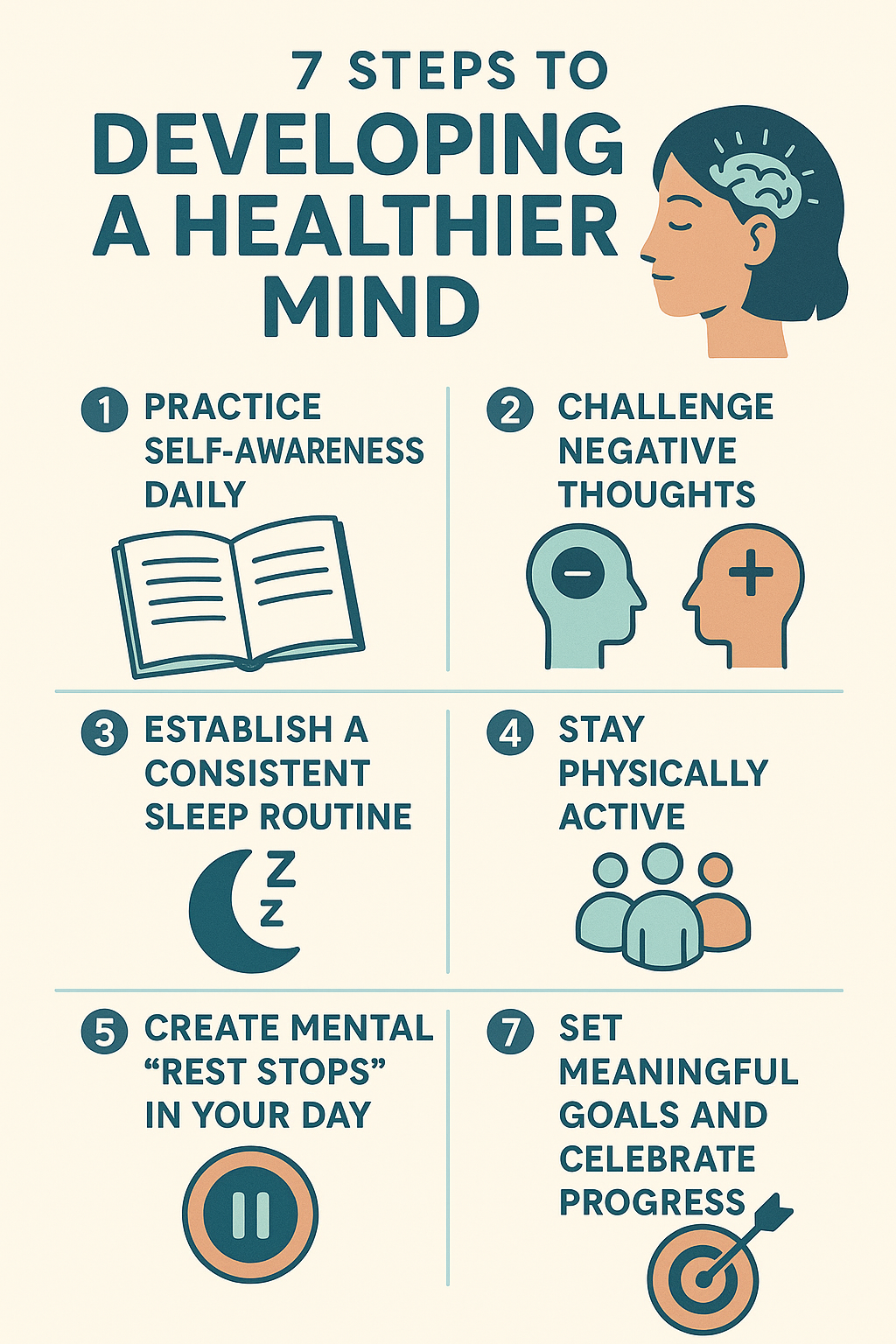Your mental health is just as important as your physical health — and often even more influential when it comes to your daily experience of life. A healthy mind allows you to handle stress, build positive relationships, maintain focus, and pursue your goals with resilience and confidence. Fortunately, cultivating mental wellness doesn’t always require therapy or medication. It can start with small, consistent steps you take every day.
Here are 7 powerful steps to help you develop a healthier, more balanced mind.
1. Practice Self-Awareness Daily
Self-awareness is the foundation of mental well-being. It involves being conscious of your thoughts, emotions, and behaviors without judgment. By recognizing your mental patterns, you gain greater control over how you respond to stress and challenges.
Simple ways to build self-awareness:
- Journaling: Write about your thoughts, feelings, and experiences each day.
- Mindfulness: Spend 5 minutes observing your thoughts without trying to change them.
- Reflection: Ask yourself, “Why am I feeling this way?” or “What triggered this reaction?”
Becoming aware of your mental state helps you identify harmful habits, break negative cycles, and build better emotional habits.
2. Challenge Negative Thoughts
Everyone experiences negative thinking, but when left unchecked, it can spiral into anxiety, depression, or self-doubt. One key to a healthier mind is learning to challenge and reframe these thoughts.
Start by noticing recurring negative beliefs, such as:
- “I’m not good enough.”
- “Things never work out for me.”
- “I always mess things up.”
Then replace them with constructive alternatives:
- “I’m learning and improving every day.”
- “This challenge will pass, just like others have.”
- “I can’t control everything, but I can control how I respond.”
Practicing this cognitive shift rewires your brain over time, building emotional resilience and optimism.
3. Establish a Consistent Sleep Routine
Lack of sleep affects your memory, concentration, mood, and stress levels. Consistent, restorative sleep is crucial for mental clarity and emotional regulation.
Tips for better sleep:
- Go to bed and wake up at the same time every day.
- Avoid screens and stimulating content 1 hour before bed.
- Create a calming bedtime routine with reading or meditation.
- Keep your room dark, quiet, and cool.
Sleep isn’t a luxury — it’s a biological need. Prioritizing it will have a profound effect on your mental wellness.
4. Stay Physically Active
Exercise is a natural antidepressant. It boosts the production of endorphins and serotonin, reduces stress hormones like cortisol, and helps clear mental fog.
You don’t need an intense workout routine. Start small:
- 30 minutes of walking, 5 days a week
- 15 minutes of yoga each morning
- Dancing or stretching to music you love
- Bodyweight exercises in your living room
The goal is consistency. Moving your body also helps release built-up tension and reconnects you with the present moment.
5. Build Healthy Social Connections
Human beings are wired for connection. Loneliness and isolation can severely impact mental health, even if you’re introverted. Cultivating meaningful relationships provides emotional support, validation, and joy.
Ways to stay connected:
- Schedule regular catch-ups with friends or family
- Join a group that shares your interests (online or offline)
- Volunteer or offer to help others — giving boosts self-esteem
- Reach out when you’re feeling low, even if it’s just a message
Being around others who uplift you is a powerful remedy for emotional burnout.
6. Create Mental “Rest Stops” in Your Day
In today’s hyper-connected world, our minds are often overloaded. Taking deliberate mental breaks throughout the day can refresh your focus and lower anxiety.
Try these techniques:
- Pomodoro Method: 25 minutes of focused work, 5-minute break
- Digital Detoxes: Silence notifications for 30–60 minutes
- Nature Breaks: Step outside for fresh air, even if just for 10 minutes
- Mindful Pauses: Close your eyes and breathe deeply for a few minutes
Treat your mind like a muscle: it needs rest to perform at its best.
7. Set Meaningful Goals and Celebrate Progress
A sense of purpose and progress fuels mental strength. Set achievable goals that align with your values and passions, and take time to acknowledge every step you complete.
Start with:
- A daily or weekly to-do list
- A long-term personal or professional goal
- A vision board to stay inspired
- Celebrating milestones — no matter how small
Progress doesn’t need to be perfect. It just needs to feel meaningful. This promotes motivation, structure, and fulfillment — all of which contribute to a healthier state of mind.
Building a Mindset That Supports You
Developing a healthier mind is not about eliminating all stress or achieving constant happiness. It’s about equipping yourself with habits and tools that help you navigate life’s ups and downs with strength, clarity, and compassion.
These 7 steps can be practiced gradually. Focus on progress, not perfection. Remember, mental wellness is a journey — and every step counts.
You are not your thoughts. You are the observer, the creator, and the one in charge of shaping the kind of inner world you want to live in. Start today, and your future self will thank you.
